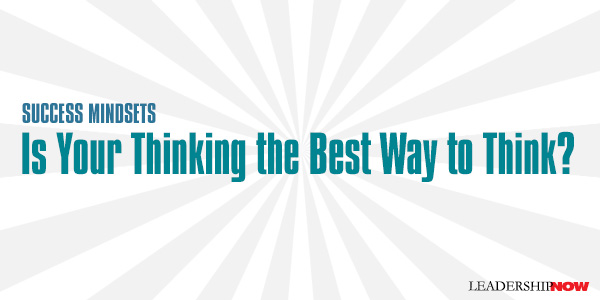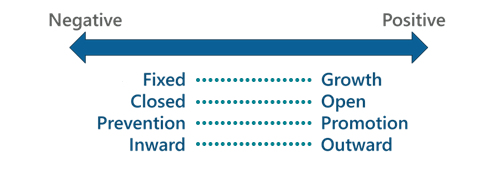 |
 |
05.06.20

Is Your Thinking the Best Way to Think?
RYAN GOTTFREDSON begins his book Success Mindsets, with the question, “Is your thinking the best way to think?” It is an extremely important question to ask and one that rarely gets asked. It’s easy to overlook this question because if I thought something was wrong in the way I thought, I would change it—maybe. After all, we’re pretty comfortable with our own thoughts. We all think we are right. While you may be reluctant to see to admit it, the thing that stands between where you currently are and the greater success in your life, work, and leadership is yourself—in particular, your thinking that your thinking is the best way to think. But the reality is that if you want to go from your current state to a more successful state, you must think about and see the world in new, different, and better ways. How we show up in the world, how we experience the world, and how we respond to it is a reflection of our thinking. When we think differently, we behave differently. Behind our behaviors is our mindset. It comes down to our mindset. Our mindset is the filter through which we view our environment and, subsequently, what is going on inside of us—our thinking and emotions.
So, if mindsets are so powerful, Gottfredson asks, “What mindsets do I need to have to be more successful?” He relates an example of dissatisfaction in his own life and concludes with an understanding that his mindset was largely negative. He began to realize that his general “funk and perceived lack of success was not because of the organizations that I worked for and the people within. Rather, I had negative mindsets that were driving me to operate in ways that limited myself.” Gottfredson provides a framework for us to begin thinking about our own mindsets. By bringing together research on mindsets from various sources, he has assembled four sets of mindsets that we need to be aware of and evaluate our place along the continuum of each. They are fixed/growth mindsets, open/closed mindsets, prevention/promotion mindsets, and inward/outward mindsets. (Each are describe in more detail here.)  Success Mindsets covers each of these in detail and explores ways to improve in each area. In addition, he has developed an assessment to help you better understand each of these mindsets, find out where you stand on each, and ways to improve. An unhealthy mindset is at the core of most of our issues. If we are “blind to our mindsets, we will misdiagnose our problems, treat them only at the surface level, and continue to be frustrated.” Think of some of the most common organizational problems: For most of us—of the thousands of people that have taken Gottfredson’s assessment, that’s about 95%—we tend to function on the negative side of at least some of the four sets of mindsets. But we can improve—change our mindset—with some conscious effort. We come by our mindsets for the most part unconsciously. From our experiences, our mind automatically forms conclusions about the world and how we should react to it. Those conclusions are not often logical or as informed as they should be. Over time we develop a mindset—a way of looking at the world—that is based on those assumptions repeated over time. Depending on our environment those habitual ways of thinking become our mindsets that either do or don’t serve us well. It is in our best interest to look at our mindsets and ask if they reflect the kind of person we wish to be going forward. Success Mindsets helps us to do just that. 
Posted by Michael McKinney at 12:02 AM
|
BUILD YOUR KNOWLEDGE
 

How to Do Your Start-Up Right STRAIGHT TALK FOR START-UPS 
Grow Your Leadership Skills NEW AND UPCOMING LEADERSHIP BOOKS 
Leadership Minute BITE-SIZE CONCEPTS YOU CAN CHEW ON 
Classic Leadership Books BOOKS TO READ BEFORE YOU LEAD |